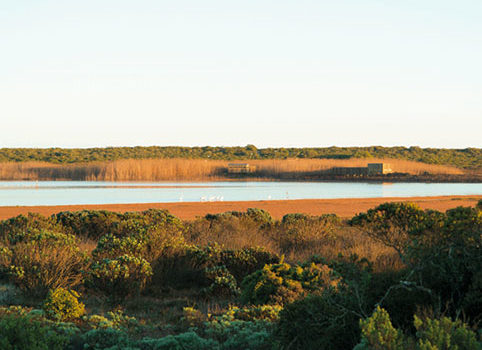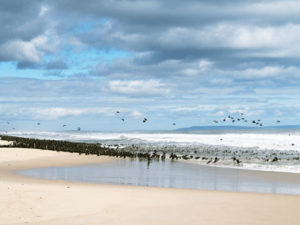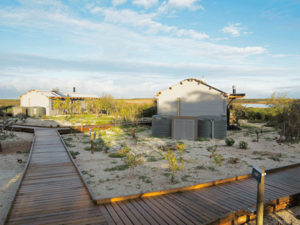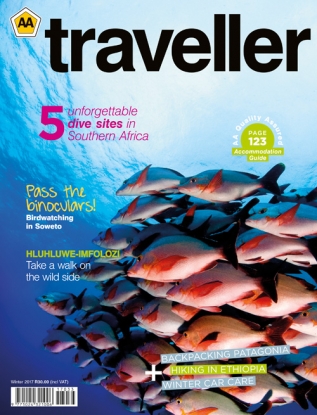Needing some downtime not too far from home, Mark Samuel heads a couple of hours up the West Coast, to little-known Rocherpan, where peace and tranquillity are the order of the day
Things have just turned serious. My brother, who’s outside relaxing in the sun, has hollered to me that in seven minutes it’ll be time to crack open a cold, hopsy beverage. By then, 12 pm will have ticked over and it’ll be socially acceptable. Besides that call to action, the only other disturbance is a multitude of bird calls – sunbirds, shovelers, weavers, robins, sugarbirds, bulbuls, you name it – all chiming in … even two or three flamingoes brazenly masquerading as seagulls out on the pan about 200m away.
Our visit to CapeNature’s Rocherpan Nature Reserve, along the West Coast, couldn’t have been timed better. ‘Just one week ago, the pan was bone dry,’ Reserve Manager Adrian Fortuin shared with us upon our arrival. ‘In the past few days, run-off from the Aurora catchment area has made its way through and, with it, throngs of birds have returned, all attracted by the water.’
The pan’s filling process is an annual affair, but not one that is guaranteed. Unseasonably low Western Cape dam levels mean water is scarce, so we are fortunate the pan’s received a life-giving top-up, and that there are now birds in abundance.
Rocherpan’s brand new two-bedroom eco-cabins – four of them in total, adding to the four existing single-bedroom units – have recently been completed, and they alone are just about reason enough to visit. Blending seamlessly into the low West Coast strandveld vegetation, the cabins are a neat fusion of timber, corrugated-steel panels, aluminium and glass, in a palette of light earth tones. The attractive, contemporary design is topped off with solar hot-water geysers and closed-combustion, free-standing fireplaces to keep off the chill in winter. The end result of all this is both beautiful and comfortable.
Out here, you can be as shiftless as a dassie, or as busy as a mongoose. A seven-kilometre hiking trail leads from the eco-cabins through the reserve to a lookout point taking in the vastness of the Atlantic Ocean. Little did we realise our walk back along the deserted beach would have us interrupting thousands upon thousands of black cormorants drying themselves in the afternoon sun.
Like an overcrowded auditorium of dark-suited accountants, they hustled and bustled as we approached and, with still-damp feathers, did their very best to take off over the water. The majority were not successful, leaving the wave zone littered with sodden, unhappy-looking birds.
At the perfect time of year, you can see whales frolicking just offshore, or even pods of dolphins. In between the crowds of damp cormorants, we spotted rare African black oystercatchers by the dozen, as well as kelp gulls, all jostling for attention.
Heading back from the beach to the cabins, we sat for a while in the newly constructed bird hide, positioned on the far side of the pan from the main camp. A winding boardwalk leads you through a reed bed to the timber hide, which offers unobstructed views of the whole pan. As the azure sky began to soften in the late afternoon light, a glassy calm descended on the water.
Sure, you may want to be active during your stay at Rocherpan, heading out on foot or mountain bike down one of the tracks, or taking a drive to the lookout; but first prize is to immerse yourself in the peace and quiet, soaking in the sights and sounds of the abundant birdlife, and the tranquil setting.
GOOD TO KNOW
Accommodation
The craftsmanship of Rocherpan’s new cabins is evident wherever you look, from the neat kitchen cabinets to the stylish exposed roof beams. Crisp concrete floors are comforting underfoot and the fireplaces add that homey touch. The doors and windows have insect screens, letting fresh air in and keeping bugs out. The eco-loos mean no flushing, but also no unpleasant odours. And, if you’re lucky enough to have rain during your stay, you’ll drift off to sleep to the gentle pitter-patter of raindrops against the steel roofing.
Self-catering cabins from R850 per night, daily conservation fee R40 (adults) and R20 (children)
Getting there
Take the N7 north from Cape Town, and turn on to the R399 before Piketberg, towards the coast. Alternatively, follow the R27 West Coast road, all the way from Cape Town to Velddrif. Rocherpan lies 25 km north of Velddrif.
S32 36 53.47 E18 18 6.73
Bookings
Rocherpan Nature Reserve is operated by CapeNature.
021 483 0190 (central reservations), www.capenature.co.za
Photography Stiv Samuel
(This article was first published in the spring 2015 issue of AA traveller magazine)






